Hello my lovely hivers, I greet you all, today we are going to discuss about Preeclampsia. Yesterday when I was about going home, a nurse brought a sample to the laboratory for urinalysis which I did, but after running the test, it indicated that the patient has protein in urine, I issued the test result to the doctor and went home. The following morning when I came to work, I saw some nurses rushing a pregnant woman to the theater room, and I never knew that she was the patient that owns the test result I did, when I tried to interview one of the nurse around, she said that the woman has Preeclampsia, indeed it was a huge experience for me.
So today I decided to enlighten us on what Preeclampsia is, symptoms, causes and possible treatments.
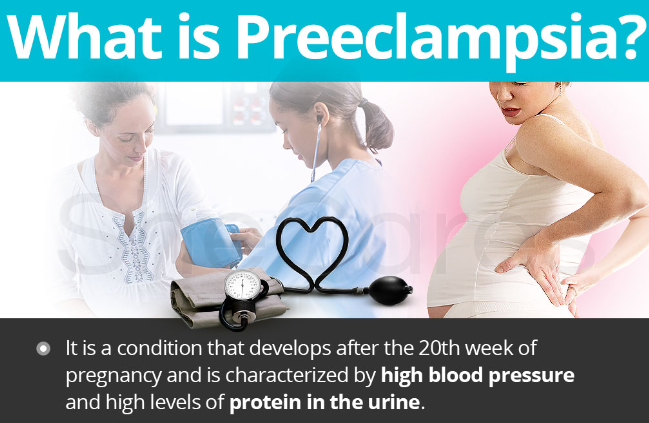
What is Preeclampsia
WHAT IS PREECLAMPSIA.
Preeclampsia formerly called TOXEMIA, is when a pregnant women have high blood pressure, protein in their urine and swelling in their legs, feet and hands. It can range from mild to severe, it usually happens late in pregnancy, though it can come earlier or just after delivery. Preeclampsia can lead to eclampsia, a serious condition that can have health risks for Mom and baby, and in rare cases cause death. If your Preeclampsia leads to seizures, that means you have eclampsia.
The only cure for Preeclampsia is to give birth, but even after delivery, symptoms of Preeclampsia can last 6weeks or more. You can help protect yourself by learning the symptoms of Preeclampsia and by seeing your doctor for regular prenatal care. Catching Preeclampsia early may lower the chances of long term problems for both mom and baby.
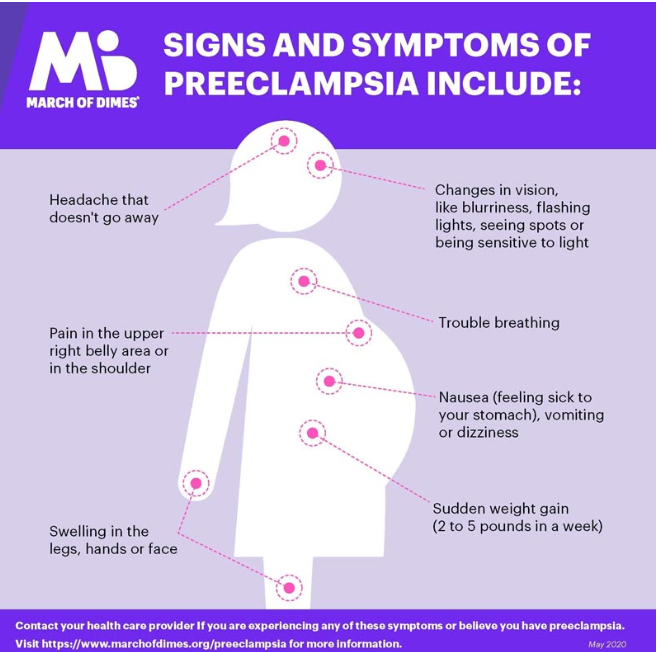
Symptoms of Preeclampsia
SYMPTOMS OF PREECLAMPSIA.
Increase in high blood pressure
Weight gain
Shoulder pain
Belly pain, especially in the upper right side.
Severe headache
Changes in reflexes or mental state.
Peeing less or not at all
Dizziness
Difficulty in breathing
Severe vomiting and nausea
Vision changes.
N/B Some women with Preeclampsia don't have any symptoms so it's important to see your doctor for regular blood pressure checks and urine test.
Preeclampsia can happen as easily as 20 weeks into pregnancy, but that's rare. Symptoms often begins after 34 weeks. In a few cases, symptoms develop after birth, usually within 48hrs of delivery, and also tend to go away on their own.
CAUSES OF PREECLAMPSIA.
Doctors have not yet identified the precise cause of Preeclampsia, but some potential causes are being explored, these includes: genetic factors, blood vessel problems and autoimmune disorder.
There are some risk factors that can increase the chance of getting Preeclampsia, these includes; Being a teen or woman over 40, Being pregnant for the first time, Having babies less than two years apart or more than 10 years apart, Pregnancy with a new partner instead of the father of your previous children, High blood pressure before getting pregnant, A history of Preeclampsia, A history of obesity, Carrying more than one baby, In- vitro fertilization, A history of diabetes, kidney disease, lupus or rheumatoid arthritis.
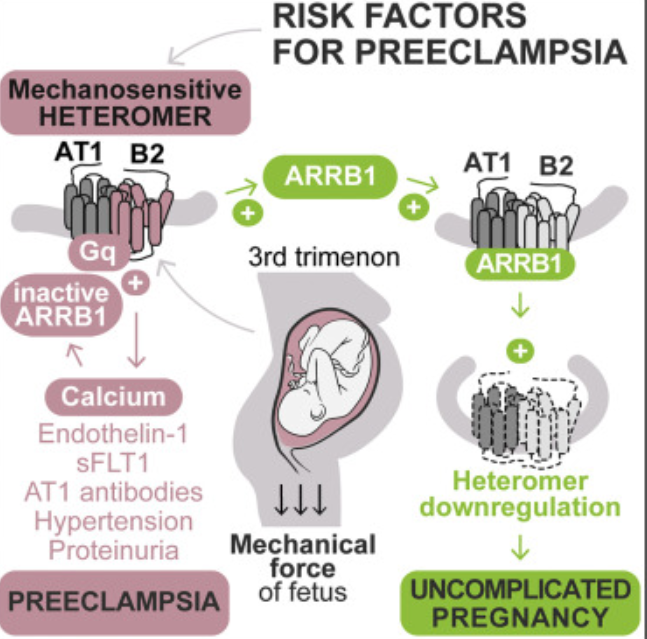
Preeclampsia complications
PREECLAMPSIA COMPLICATIONS
Preeclampsia can keep your placenta from getting enough blood, which can cause your baby to be born very small. This is called FETAL GROWTH RESTRICTION. It's also one of the most common cause of premature births and the complications that can follow, including learning disabilities, epilepsy, cerebral palsy, hearing and vision problems.
Preeclampsia can cause rare but serious complications that includes; Stroke, Seizure, Fluid build up in your chest, Heart failure, Reversible blindness, Bleeding from your liver and Bleeding after you have given birth.
When Preeclampsia or eclampsia damages your liver and blood cells, you can get a complication called HELLP syndrome, that stands for:
H- HEMOLYSIS: This is when the red blood cells that carry oxygen through your body breaks down.
EL- ELEVATED LIVER ENZYMES: High levels of these chemicals in your blood means liver problem.
LP- LOW PLATELET COUNTS: This is when you don't have enough platelet, so your blood doesn't clot the way it should.
Preeclampsia can also cause your placenta to suddenly separate from your uterus, which is called PLACENTA ABRUPTION, this can lead to still birth.
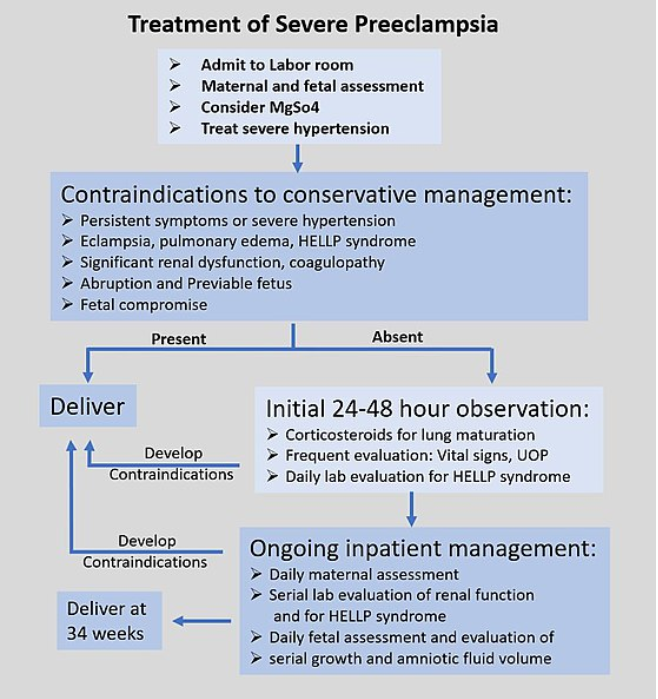
Preeclampsia treatment
PREECLAMPSIA TREATMENT.
The only cure for Preeclampsia and eclampsia is to give birth. Your doctor will talk with you about when to deliver based on how far along your baby is, how well your baby is doing in your womb, and severity of your Preeclampsia.
If your baby has develop well, usually by 37 weeks or later, your doctor may want to induce labor or do a cesarean section. this will keep Preeclampsia from getting worse. If your baby isn't close to term, you and your doctor may be able to treat mild Preeclampsia until your baby has developed enough to be safely delivered. The closer the birth is to your due date, the better it is for your baby.
If you have a mild Preeclampsia, without severe features, your doctor may prescribe; Bed rest, either at home or in the hospital, Careful monitoring with a fetal heart rate monitor and frequent ultrasounds, Medicine to lower your blood pressure, Blood and urine test and Injections of magnesium to prevent eclampsia - related seizure.
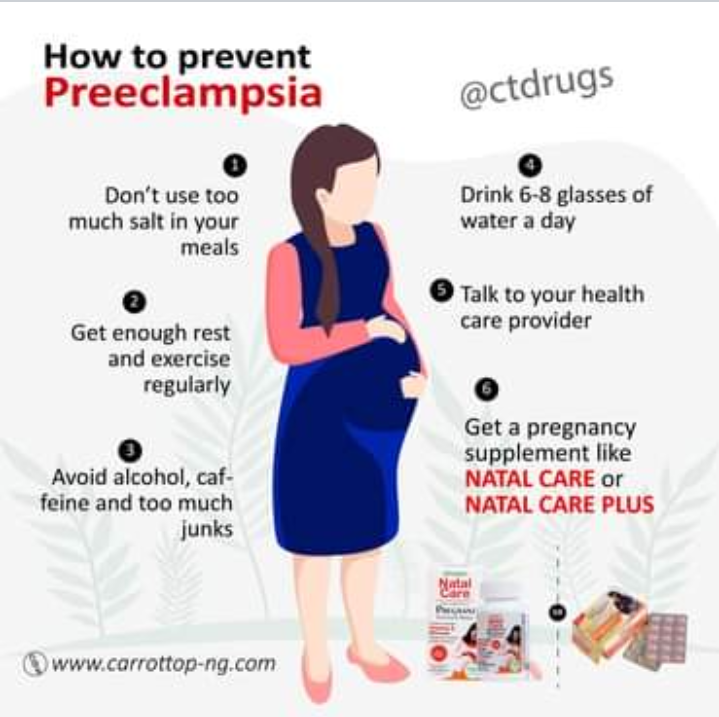
Preeclampsia prevention
PREECLAMPSIA PREVENTION
If you have a greater chance of getting Preeclampsia, talk to your doctor about making lifestyle changes that can help keep you healthy. Also learn the warning signs for Preeclampsia and pay attention to your body so that you can spot symptoms right away, Early diagnosis through recognition and proper response to symptoms is the key. Prompt treatment saves lives, you might need to loose weight if you're over weight, stop smoking, exercise regularly and get your blood pressure or blood sugar under control.
I will stop at this point having explained all that we need to know about Preeclampsia starting from the definition down to the treatment, and I hope the article was simple enough to comprehend as well as beneficial too. I will gladly welcome your wonderful comments and questions as regards to this post. Thanks for your time and support.
Reference
What is Preeclampsia
Causes of Preeclampsia
Complications of Preeclampsia
How to prevent Preeclampsia



